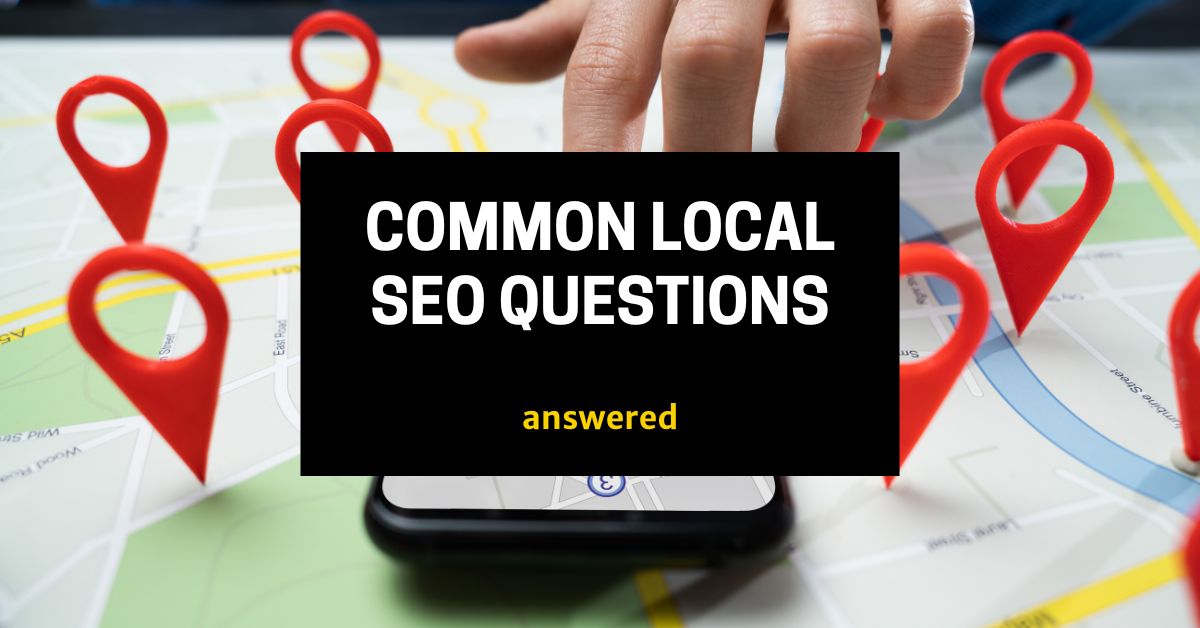Local SEO is like a game of chess – it requires strategic thinking, careful planning, and execution of the right moves to win. As a small business owner, I know how overwhelming it can be to navigate the complex world of local search rankings. With so many factors to consider and algorithms constantly changing, it's easy to feel lost and unsure about where to start.
In this article, I'll share insights into some common local SEO questions that businesses often have. From understanding what local SEO is and why it's important for your business to optimizing your website and choosing the right SEO agency, we'll cover everything you need to know in order to improve your online presence and attract more local customers.
So whether you're just starting out or looking for ways to compete with larger businesses in your area, keep reading for valuable tips on how to up your local SEO game.
What is Local SEO?
You already know that local SEO involves optimizing your website to appear in local search results, but did you know that it's not just about proximity, prominence, and relevance? Local SEO encompasses many factors beyond those critical elements.
Inbound marketing, effective keywords, on-page SEO work, social media strategy, content creation, local business directory listings, customer reviews & ratings, link building, and mobile-friendly websites are all essential components of a successful local SEO strategy.
One of the most important aspects of a local SEO campaign is keyword research. Selecting the right keywords for your business can make or break your online presence. The focus keyword phrase should be the primary phrase you want to rank for on a particular page or post, while long-tail keyword phrases are highly specific and targeted phrases that can help capture more traffic from people searching for exactly what you offer.
Lastly, NAP (Name Address Phone) consistency across directories is also critical for a small local businesses as it helps search engines like Google understand where your business is located and how to contact you. It's essential to have accurate and consistent information across platforms like Google My Business (GMB), Yelp, or Bing Places as this will impact how often you appear in search results pages.
How does Local SEO differ from traditional SEO?
When it comes to optimizing your online presence for local search, it's important to understand how Local SEO differs from traditional SEO tactics.
While both aim to improve a website's ranking on search engine results pages (SERPs), Local SEO focuses specifically on location-based searches. This means that businesses with physical storefronts or service areas must prioritize Local SEO strategies in order to appear in relevant local search results.
Unlike traditional SEO, which may focus primarily on national or global keywords and backlinking, Local SEO prioritizes the use of geo-specific keywords and business directories. For example, a dentist in Seattle would want to rank highly for ‘dentist near me' searches within Seattle city limits, while a national retailer may focus more heavily on generic product keywords like ‘running shoes.'
Another key difference between Local SEO and traditional SEO is the importance of customer reviews and engagement. Positive reviews not only help build credibility and trust with potential customers but also signal relevancy to Google's algorithms.
Businesses must actively manage their online reputation by monitoring reviews across multiple platforms and responding appropriately. By prioritizing these unique tactics, businesses can fully optimize their online presence for local search and increase visibility among potential customers in their area.
Why is Local SEO important for businesses?
Imagine your business appearing at the top of search results when someone in your area searches for products or services you offer. Local SEO can make this a reality and is crucial for businesses with physical locations or service areas to attract local customers. Good Local SEO can actually get you customers without having spend on expensive advertising. Its not free because you either need to spend the time to learn it or pay a search marketing expert. However, its still a very low cost way to acquire customers.
With more people using their smartphones to find nearby businesses, it's essential to optimize your website and Google My Business listing for local search. Local SEO helps businesses increase visibility in search engine results pages (SERPs) within a specific geographic location. This means that when someone types ‘best pizza near me' or ‘plumber in [city name]', your business has a better chance of showing up on the first page of results.
By optimizing your website with keywords related to your industry and location, building citations, managing online reviews, and keeping GMB updated, you can improve your chances of ranking higher in local search.
Having a strong local SEO strategy can also help build trust with potential customers by providing accurate information about the business's location, hours of operation, contact information, and reviews from other customers. It's important to remember that many people rely on online reviews before making a purchase decision.
By actively monitoring and responding to customer feedback online, businesses can build their reputation as a reliable source for products or services in their community. Investing time and resources into local SEO can ultimately lead to increased traffic to your website, foot traffic into your store or office, and ultimately more revenue for your business.
What are the key components of a Local SEO strategy?
Creating a successful Local SEO strategy requires incorporating various key components. These include keyword research, on-page optimization, local citations, customer reviews, and link building.
Keyword research is critical to identifying the primary keywords with high search volume and searcher intent that should be targeted for each page of your website. On-page optimization involves optimizing individual pages for the identified focus keywords by ensuring proper site structure, meta descriptions, header tags, and alt tags for images.
Local citations are references to your business's name, address, and phone number (NAP) on other websites or directories. Building consistent local citations across multiple platforms can improve your visibility in local search results.
Customer reviews also play a significant role in Local SEO as they reflect the trustworthiness and relevancy of your business to potential customers. Encouraging positive reviews through review funnels and responding to negative ones can help increase review velocity and improve rankings.
Link building refers to acquiring links from other relevant websites back to yours. Quality external links boost domain authority as an expert in the industry while internal linking helps distribute link equity throughout the website.
Creating a comprehensive Local SEO strategy that incorporates these components will help optimize your website for higher rankings in local search results pages and drive more organic traffic to your business.
How do I optimize my website for Local SEO?
Optimizing your website for local SEO is like planting a garden – it takes time and effort to cultivate, but the end result can be a bountiful harvest of increased visibility and traffic.
Once you've done your keyword research, incorporate these keywords into your website copy, meta titles and descriptions, header tags, and image alt tags. Make sure your content is high-quality, engaging, and informative.
Also, make sure the keywords and text used on your website are the same keywords you use in your GMB listing.
Remember that optimizing for local SEO is an ongoing process – it's not something you can set up once and forget about. Regularly monitor your rankings, track changes in search behavior in your area, update your content as needed, and keep building quality backlinks to improve authority.
How do I choose the right keywords for Local SEO?
Choosing the right keywords for Local SEO is crucial to attracting high-intent traffic and increasing visibility in local search results. Keyword research takes time, but it's worth it to find the right phrases that will drive users to your site.
Start by brainstorming a list of potential keywords and phrases, then use tools like Google AdWords Keyword Planner or Moz's Keyword Explorer to see which terms have high search volume and low competition. Also, visit this page here for a list of free keyword research tools.
When selecting keywords for Local SEO, focus on searcher intent rather than just search volume. It's important to choose keywords that reflect what your target audience is searching for when looking for businesses like yours.
For example, if you're a Mexican restaurant in Los Angeles, ‘Mexican food' may be too broad of a keyword phrase since it could attract users looking for recipes or history rather than those searching for restaurants in LA. Instead, consider more specific phrases such as ‘Mexican restaurant Los Angeles' or ‘best tacos in LA'.
Don't forget about long-tail keywords – highly specific phrases that may not have as much search volume but can still attract high-intent traffic. Long-tail keywords often include location-specific details or niche topics related to your business. Consider incorporating these into your content strategy and utilizing them in blog posts or landing pages focused on particular services or products offered by your business.
What are the best practices for optimizing my Google My Business listing?
To maximize your visibility on Google Maps and attract more local customers, it's crucial to ensure that your Google My Business listing is fully optimized with accurate information and engaging content.
Start by claiming and verifying your listing so you can update your business hours, phone number, website URL, and other details. Add relevant categories that accurately describe your business so people searching for services can easily find you.
Complete all the sections of your Google My Business profile, including uploading high-quality photos of your business location, products or services offered, team members, customer reviews, and virtual tour if applicable. Write a compelling description of what sets your business apart from competitors in a way that appeals to potential customers.
Responding to customer reviews promptly shows that you care about their feedback and can help improve ratings and attract new customers.
Make sure you take your time and fill out all the form fields. Don't get lazy. The more text you have the more you can rank for different keywords. You add a lot of content to the products and services section.
How do I get more online reviews for my business?
One of the best ways to encourage customers to leave a review is by simply asking them. After completing a purchase or receiving a service, follow up with an email or text message thanking them for their business and kindly requesting that they leave a review on Google or another relevant platform.
Another strategy is to make it as easy as possible for customers to leave a review. Include direct links to your Google My Business page or other review sites in your email signature, or on social media profiles.
You can even mention leaving reviews on printed materials like receipts, invoices and business cards. Consider creating a QR code to make easy for someone to scan the link and take them right to your review page. You can find QR code maker here. Here's how you get your review link.
Why are online reviews important for Local SEO?
Getting more online reviews for your business is crucial for building trust with potential customers and improving your local SEO.
First of all, search engines like Google take into account the quantity and quality of online reviews when determining local search rankings. This means that businesses with a higher number of positive reviews are more likely to rank higher in local search results than those without any or with negative reviews.
Secondly, the consistency and frequency of reviews matter. So if you go out and get 20 reviews in one month and then get nothing for 6 months, you won't get as much value out of the number of reviews.
Lastly, online reviews provide social proof to potential customers. When people see the positive feedback from previous customers, they're more likely to trust and choose your business over competitors who have fewer or negative reviews. This absolutely increases click-through rates.
What role does social media play in Local SEO?
As a general rule, Google doesn't use social media heavily in ranking your business in local search results. However, you do get some minor value from links and mentions on social media platforms.
More importantly, utilizing social media can significantly boost your local SEO efforts by increasing brand awareness, driving traffic to your website, and providing valuable social signals that search engines view as trusted endorsements.
For example, a small coffee shop in Seattle regularly posts Instagram stories showcasing their locally sourced beans and unique latte art, leading to increased engagement and foot traffic from followers who discovered them through the platform.
How do I build local citations and why are they important?
Building local citations is essential for businesses to establish their online presence and increase visibility in search engine results. This is done by ensuring consistent and accurate information about their business is listed on various directories and websites. Citations are references online to a company's NAP (name, address, phone) and website URL. The more quality citations a business has, the more authority it has in the eyes of search engines like Google.
Here are three reasons why building local citations is important for businesses:
- Improves Local Rankings: Accurate NAP citations will directly improve a business's ranking in local search results.
- Increases Online Visibility: The more places a business appears online, the greater its chances of being seen by potential customers.
- Boosts Trustworthiness: Accurate listings on trusted directories signal to customers and search engines that a business is legitimate.
To build local citations, businesses should start with major directories like Google My Business, Yelp, Bing Places for Business, Facebook Pages for Business, Apple Maps Connect and Foursquare. It's important to ensure consistency in listing information such as NAP details and categories across all directories. Some other strategies include leveraging industry-specific directories or creating profiles on community-based platforms or blogs where customers may be searching for services or products locally.
What is NAP consistency and why is it crucial for Local SEO?
NAP is an acronym for Name, Address, Phone number. To ensure your business is visible to potential customers in local search results, it's crucial that you maintain NAP consistency across all online directories. Having consistent NAP information helps Google verify the legitimacy of your business and ensures accuracy in local search results. Inconsistencies or discrepancies in NAP information can confuse search engines and lead to lower rankings or even penalization.
NAP consistency is essential for local SEO because it provides a clear signal to search engines that your business is legitimate and trustworthy. When you have inconsistent or inaccurate NAP information across various online directories, it can cause confusion for both customers and search engines about where your business is located, what services you offer, and how to contact you. This leads to a poor user experience which negatively impacts your rankings.
How can I improve my website's loading speed for better Local SEO?
Improving your website's loading speed is crucial for enhancing your Local SEO efforts, as it can significantly impact user experience and ultimately affect your search engine rankings. Slow-loading websites can be frustrating for users, leading them to abandon the site and look elsewhere. This high bounce rate signals to search engines that the content on the website may not be relevant or useful to users, which can negatively impact rankings.
Here are three good ways you can improve your website's loading speed for better Local SEO:
- Optimize images: Large images can take up a lot of space and slow down page load times. Compressing images without sacrificing quality can help reduce file size and speed up loading times.
- Minimize HTTP requests: Every time a browser loads a webpage, it sends an HTTP request for each element on the page (e.g., images, scripts). Reducing the number of HTTP requests by combining files and using CSS sprites can help speed up loading times.
- Use caching: Caching involves storing frequently accessed data (such as webpages) in memory or on disk so that they don't need to be retrieved every time they're requested. Implementing browser caching and server-side caching can help reduce server load and improve page load times.
A lot of business owners that build their websites may not have the skills to improve website speed. You can generally find contractors fairly easily on Upwork and other freelancer hiring sites.
What is schema markup and how can it improve my Local SEO?
Schema markup can give your website an edge in local search results, allowing you to provide more detailed and relevant information to both users and search engines. It's essentially a code that you can add to your website's HTML to help search engines understand the content on your website better.
This helps improve your website's visibility and ranking in search engine results pages. With schema markup, you can provide more specific information about your business, such as its address, phone number, hours of operation, products or services offered, reviews and ratings, and much more.
By doing so, you're providing valuable information to potential customers who are searching for businesses like yours online. Additionally, since this information is structured data that follows a standardized format recognized by search engines like Google and Bing, they're able to display it in rich snippets or knowledge graphs in their search results.
How can I use local events and sponsorships to boost my Local SEO?
Did you know that businesses that participate in local events and sponsorships can see a boost in their online presence? In fact, 74% of consumers say they are more likely to purchase from a business after seeing them at an event. This is why it's important to consider partnering with local organizations or hosting your own events as part of your Local SEO strategy.
Here are some ways local events and sponsorships can help improve your online visibility:
- Increased brand awareness: By participating in local events or sponsoring them, you're putting your brand name out there and increasing brand recognition within the community. This can lead to more people searching for your business online and ultimately improving your search engine rankings.
- Backlinks: When you sponsor an event or get mentioned on a website promoting the event, it's an opportunity for backlinks to your website. Backlinks from high-quality websites are an important ranking factor for search engines, so this can have a positive impact on your Local SEO efforts.
- User-generated content: Encouraging attendees to post about the event on social media using specific hashtags or tagging your business can generate user-generated content (UGC) related to your brand. UGC is valuable because it shows that real people are engaging with and endorsing your business.
However, it's important to make sure any events or sponsorships align with your brand values and target audience. For example, if you run a health food store, sponsoring a fast food festival may not be the best fit. Additionally, make sure any mentions or links back to your website are done appropriately and naturally – Google penalizes websites that engage in link schemes or manipulative tactics.
How important is mobile optimization for Local SEO?
Mobile-friendly websites are a must-have. In today's mobile-first world, prioritizing mobile optimization isn't just an option – it's essential if you want to stand out from the competition and attract more customers to your local business. You will not rank at all in search if Google identifies your website as not being mobile friendly.
You can't afford to ignore mobile optimization if you want your local business to succeed online. With more and more people using their smartphones to search for nearby services, a poorly optimized website can quickly turn potential customers away.
Mobile optimization means making sure that your website is easy to navigate on a small screen, loads quickly, and provides all the necessary information without forcing users to zoom in or scroll through endless pages. This is so important that Google actually provides a tool so you can check to make sure your website is optimized for mobile.
How do I track and measure the success of my Local SEO efforts?
To gauge the effectiveness of your local SEO strategy, it's crucial to regularly track and analyze key performance indicators such as website traffic, ranking positions, and conversion rates.
One way to do this is by using Google Analytics, which can provide insights into website traffic sources, visitor behavior, and goal completions. By monitoring these metrics over time, you can identify areas for improvement and make data-driven decisions to optimize your local SEO efforts.
Another important tool for tracking local SEO success is Google My Business Insights. This feature provides information on how often your business appears in search results, the number of views and clicks on your listing, and customer search queries.
Lastly, you can use professional tracking software. We have a free SEO audit tool that comes with the ability to track your local SEO results. You can find it here.
What are the most common Local SEO mistakes to avoid?
If you're navigating the waters of local SEO, it's important to steer clear of the rocky shores of mistakes that can sink your rankings like an anchor dragging you down.
After looking at hundreds of local businesses, the biggest issue I've seen is neglecting their Google My Business listing and failing to optimize GMB correctly.
Most businesses I see do at least one if not more:
- Don't even have a GMB listing
- Don't have access to their Google listing
- Leave a bunch of form fields blank
- Have a poorly worded, largely incomplete listing
- Never respond to reviews
- Never ask their customers for reviews.
This lack of effort is causing them to lose a massive amount of new customers. Period. End of story. It's such a shame.
How can I stay up-to-date with the latest Local SEO trends and changes?
Now that we've covered the most common Local SEO mistakes to avoid, it's important to stay up-to-date with the latest trends and changes in the field.
As search engines like Google continue to evolve their algorithms, it's crucial for businesses to stay ahead of the curve and adapt their strategies accordingly.
One way to stay informed is by following industry experts and thought leaders on social media platforms such as Twitter or LinkedIn. These individuals often share insights and tips on local SEO best practices, as well as updates on any major algorithm changes or updates from search engines. A quick Twitter search for “local seo” will pull up a lot of good accounts.
Another helpful resource is attending conferences or webinars focused on local SEO. These events feature presentations from experts in the field, providing attendees with valuable information and actionable takeaways. Additionally, these events offer opportunities to network with other professionals in the industry, allowing for knowledge sharing and potential collaborations.
How do I handle negative online reviews for my business?
Dealing with negative online reviews can be a challenging and frustrating experience for you as a business owner, but it's important to handle them professionally and proactively.
First off, in most cases you cannot get them removed. Google does allow you to flag reviews, but in recent years, they rarely will remove them. So you really need to focus on dealing with them.
Begin by listening carefully to the customer's complaint and acknowledging their experience. Avoid getting defensive or making excuses, as this can escalate the situation further. Remember, you are mostly writing for people reading these reviews. Getting angry, and making excuses makes you really bad to readers.
Once you've acknowledged the issue, offer a solution to make things right. This could include offering a refund or exchange, providing additional information or resources, or simply apologizing for any inconvenience caused. It's important to address the specific concerns raised in the review and show that you are taking steps to improve your service.
Don't forget to follow up with the customer after resolving the issue. This demonstrates that you value their feedback and are committed to providing excellent service in the future. If you resolve the issue, you should ask them to remove the review. Sometimes they will, sometimes they won't, but it's worth asking.
A great response can actually generate more customers than a bunch of 5-star reviews. No business can make everyone happy. Most people are reasonable and just want to see how you respond. Also, negative reviews can actually be an opportunity for growth and improvement if handled effectively.
How can I compete with larger businesses in my local area?
To level the playing field against bigger competitors in your area, focus on providing personalized and exceptional customer service that creates a strong connection with your local community. By building relationships with customers, you can create loyal brand advocates who will spread positive word-of-mouth about your business. This is especially important for small businesses that may not have the same resources as larger companies.
Another way to compete with larger businesses is to establish yourself as an expert in your industry through content creation and thought leadership. By creating blog posts, videos, or social media content that provides value to potential customers, you can position yourself as a trusted authority in your field. This can also help improve your website's search engine optimization (SEO) by generating backlinks from other websites and increasing engagement on social media.
What role do backlinks play in Local SEO?
Getting quality backlinks is like building a strong foundation for your local SEO strategy, as they signal to search engines that other reputable websites consider your content trustworthy and valuable. Backlinks are links from external sites that point to your website, and they can have a significant impact on how well your site ranks in local search results.
Here are some important things to know about backlinks:
- Not all backlinks are created equal: The quality of the website linking to yours matters more than the quantity of links you have. A single high-quality link from an authoritative site can be worth more than dozens of low-quality links.
- Local relevance is key: To maximize the impact of backlinks on your local SEO, it's important to get links from websites that are relevant to your business and location. For example, if you're a dentist in Chicago, getting a link from a local health clinic or dental association would carry more weight than a link from a random blog.
- Links should be natural: Search engines look for natural-looking links that make sense within the context of the content. Avoid buying or trading links with other sites, as this can lead to penalties or even getting banned from Google.
- Diversify your sources: Getting all your backlinks from one type of source (such as directories) can actually hurt your rankings. Aim for variety by getting links from different types of sites such as blogs, news outlets, social media platforms, etc.
- Keep an eye on competitors: Pay attention to where your competitors are getting their backlinks and try to get similar ones for yourself.
Building quality backlinks should be an integral part of any local SEO strategy. Focus on getting natural-looking links from relevant sources with high authority and diversify your sources for maximum impact.
How can I target multiple locations with my Local SEO strategy?
First and foremost, make sure each location has its own Google My Business listing with accurate information and unique content. This will help Google understand that each location is distinct and relevant to local searches.
Additionally, create location-specific landing pages on your website that highlight each location's products/services, team members, customer reviews, and other unique features.
If you service a fairly large area, then you can consider opening a satellite office. We have a client that already spends $20,000 a month on advertising. Even though they had the budget and operation to take on new business, we decided not to just run more ads. Instead we opened a small office in a suburb.
We created GMB listing and location page, then worked on heavily optimizing it. It took a few months of hard work but this listing started producing leads at a fantastic pace. Currently, the cost to acquire a customer with this strategy is 7% of the cost to acquire customers with ads. Plus, they use the office to occasionally meet customers and they are able to store items such as uniforms, office supplies and equipment.
How do I choose the right Local SEO agency for my business?
Go to our contact page and fill out a form. We are the right local SEO Agency.
OK. OK. Enough of the shameless plug. Lets talk about how to find the right agency.
You want to find someone that will be a partner who understands your goals and can help you achieve them. Here are some tips to help you choose the right Local SEO agency:
- Look for experience: An experienced Local SEO expert will have a track record of success and will know how to optimize your website and online presence for local search. Look for an agency that has worked with businesses in your industry or niche, as they'll be familiar with the challenges you face.
- Check their references/results: Before hiring an agency, ask for references from past clients. Contact these clients and ask about their experience working with the agency. Did they see an improvement in their local search rankings? Were they happy with the results?
- Ask about their approach: Every Local SEO agency has its own approach to optimizing websites for local search. Make sure you understand how the agency plans to improve your online presence and what tactics they'll use to get there.
Remember that choosing a Local SEO agency is an investment in your business's online success. Take the time to do your research and hire a local SEO agency that aligns with your goals and values. A good agency could easily generate 5 to 20X ROI on the cost. For example, you spend $400 for a monthly service and start generating $8000 a month in revenue. This is called a no brainer.
Local SEO Questions Answered: Conclusion
By now, you should have a good understanding of what local SEO is, why it's important for businesses and how you can optimize your online presence to attract more customers in your area.
But maybe you're thinking: “This all sounds great, but I don't have the time or expertise to implement these strategies on my own.”Don't worry! You don't have to go at it alone.
There are plenty of local SEO agencies out there that specialize in helping small businesses like yours improve their online visibility and attract more local customers. Partnering with a reputable agency can be a smart investment for your business. If you want to discuss what we do, then contact us today!







